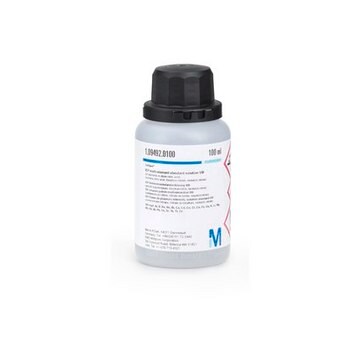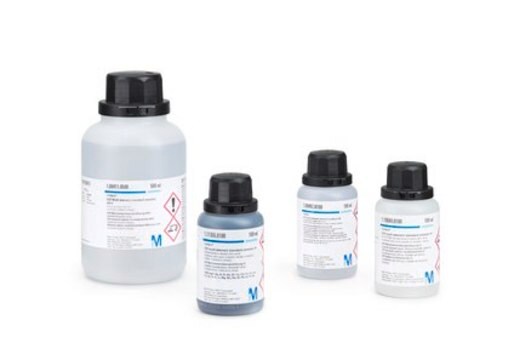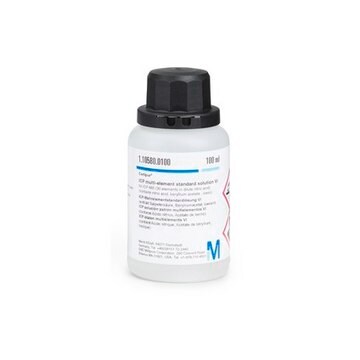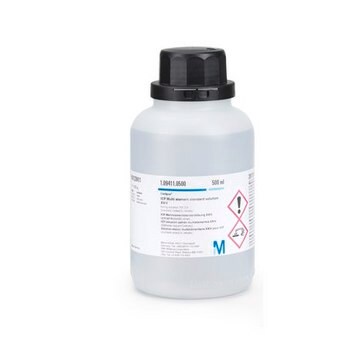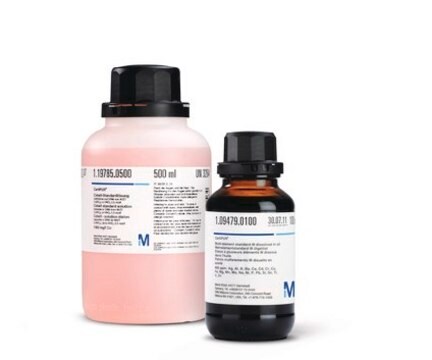1.11355
ICP multi-element standard solution IV
(23 elements in diluted nitric acid) 1000 mg/l: Ag, Al, B, Ba, Bi, Ca, Cd, Co, Cr, Cu, Fe, Ga, In, K, Li, Mg, Mn, Na, Ni, Pb, Sr, Tl, Zn Certipur®
Synonym(s):
Nota 1 A
About This Item
Recommended Products
Quality Level
product line
Certipur®
technique(s)
ICP: suitable
pH
1 (20 °C in H2O)
density
1.09 g/cm3 at 20 °C
format
multi-component solution
storage temp.
15-25°C
Related Categories
Application
- ICP multi-element calibration standard: The article titled "Schiff base functionalized silica gel for simultaneous separation and preconcentration of Cu(II), Ni(II), and Cd(II) in pharmaceuticals and water samples" highlights the use of ICP multi-element standard solution IV in trace metal analysis, demonstrating its critical role in ensuring the accuracy and reliability of elemental quantification in various matrices, including pharmaceuticals (Tokay and Bağdat, 2022).
- Trace metal standard for biopharmaceutical research: This standard solution is essential for the precise calibration of ICP-MS instruments used in the pharmaceutical industry, helping to meet stringent quality control standards for elemental impurities.
- Elemental impurities testing in pharmaceuticals: ICP multi-element standard solution IV is employed to verify compliance with regulatory requirements for elemental impurities in pharmaceutical products, ensuring patient safety and product efficacy.
Analysis Note
Al (Aluminium): 1000 mg/l
B (boron): 1000 mg/l
Ba (barium): 1000 mg/l
Bi (bismuth): 1000 mg/l
Ca (calcium): 1000 mg/l
Cd (cadmium): 1000 mg/l
Co (cobalt): 1000 mg/l
Cr (chromium): 1000 mg/l
Cu (Copper): 1000 mg/l
Fe (iron): 1000 mg/l
Ga (Gallium): 1000 mg/l
In (Indium): 1000 mg/l
K (potassium): 1000 mg/l
Li (Lithium): 1000 mg/l
Mg (Magnesium): 1000 mg/l
Mn (Manganese): 1000 mg/l
Na (sodium): 1000 mg/l
Ni (Nickel): 1000 mg/l
Pb (lead): 1000 mg/l
Sr (Strontium): 1000 mg/l
Tl (Thallium): 1000 mg/l
Zn (Zinc): 1000 mg/l
Other Notes
Legal Information
Signal Word
Danger
Hazard Statements
Precautionary Statements
Hazard Classifications
Aquatic Acute 1 - Aquatic Chronic 2 - Carc. 1A - Carc. 1B Inhalation - Eye Dam. 1 - Met. Corr. 1 - Muta. 1B - Repr. 1B - Skin Corr. 1B - Skin Sens. 1 - STOT RE 2
Supplementary Hazards
Storage Class Code
6.1D - Non-combustible, acute toxic Cat.3 / toxic hazardous materials or hazardous materials causing chronic effects
WGK
WGK 3
Flash Point(F)
Not applicable
Flash Point(C)
Not applicable
Certificates of Analysis (COA)
Search for Certificates of Analysis (COA) by entering the products Lot/Batch Number. Lot and Batch Numbers can be found on a product’s label following the words ‘Lot’ or ‘Batch’.
Already Own This Product?
Find documentation for the products that you have recently purchased in the Document Library.
Customers Also Viewed
Protocols
F&B, elemental analysis, inductively coupled plasma, regulatory, food safety, food chemistry, nutritional value.
Related Content
Atomic spectroscopy techniques like AAS, AES, ICP-OES, and ICP-MS identify and quantify elemental composition in samples.
Atomic spectroscopy uses the energy absorbed or emitted by electrons to identify and quantify the elemental composition of a sample. It includes various analytical techniques, such as AAS, AES, FAA, GFAA, ICP-OES, ICP-MS and XRF.
Atomic spectroscopy uses the energy absorbed or emitted by electrons to identify and quantify the elemental composition of a sample. It includes various analytical techniques, such as AAS, AES, FAA, GFAA, ICP-OES, ICP-MS and XRF.
Atomic spectroscopy uses the energy absorbed or emitted by electrons to identify and quantify the elemental composition of a sample. It includes various analytical techniques, such as AAS, AES, FAA, GFAA, ICP-OES, ICP-MS and XRF.
Our team of scientists has experience in all areas of research including Life Science, Material Science, Chemical Synthesis, Chromatography, Analytical and many others.
Contact Technical Service
